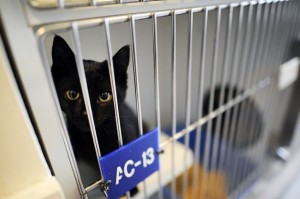SF Chronicle: Black cats, take note: Beware of people crossing your path. They’re likely to bring bad luck.
According to a UC Berkeley study, black cats are unfairly stereotyped and far less likely than their fair-haired, blue-eyed cousins to be adopted at animal shelters.
In fact, orange or Siamese cats are usually adopted within their first day at a shelter. Black cats can languish for months because of people’s preconceptions about their personalities and behavior, according to Mikel Delgado, a UC Berkeley doctorate student who authored the study.
Shelters have known this for years. Black cats are far more likely to be euthanized than other cats, shelter staffers say.
“Black cats are some of the most sleek, clothing-friendly cats. You won’t have little white hairs over everything. But for some reason, they are, hands down, the hardest to find homes for,” said Willow Liroff, head cat volunteer at the Oakland Animal Shelter.
About half the cats at the Oakland and San Francisco shelters are black or mostly black. Shelters try all manner of tactics to find homes for black cats, such as two-for-one specials and other promotions like “Black Is the New Black,” “Adopt a Mini-Panther,” “Black Goes With Everything” and “Back in Black.”
No one’s sure why people ascribe certain characteristics to black cats. There have been myths for centuries about black cats being harbingers of bad luck or accessories to witchcraft, but no evidence suggests that black cats are any more demonic than other cats, Delgado said.
“Black cats can be just as friendly and active,” she said. “But a lot of people seem to prefer orange cats. We wanted to find out why.”
Delgado, who formerly worked at an animal shelter, surveyed 189 people about their opinions on felines. The respondents said orange cats are friendly, tortoiseshell cats are intolerant and aloof, white cats are less active and shy, and they admitted negative or no opinion whatsoever about black cats.
That’s the problem, shelter staff said. People walk right by the black cats.
“I think when people come to adopt a cat, they want something exotic looking. A cool striped mackerel tabby, or something fluffy and cute,” said Vicky Guldbech, operations manager at the San Francisco animal shelter. “The poor black kitties are just ignored.”
Delgado, who’s earning her doctorate in psychology and has two tabby cats, is studying human-animal relationships and why people ascribe certain personality traits to animals.
Her study was published in Anthrozoos, the official journal of the International Society for Anthrozoology.
Studies and Halloween myths mean nothing to Buster, a frisky 4-month-old black cat at the Oakland shelter. He spent much of Monday morning batting a pink feather around the visiting room, not in the least concerned about witchcraft.
“Cats are such individuals,” Liroff said. “Even the black cats are all different. Some are sleek, some have green eyes, some have round faces. … We have no idea why people don’t want to adopt them.”
